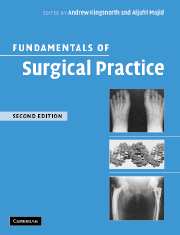Book contents
- Frontmatter
- Contents
- Preface
- Contributors
- 1 Preoperative management
- 2 Principles of anaesthesia
- 3 Postoperative management
- 4 Nutritional support
- 5 Surgical sepsis: prevention and therapy
- 6 Surgical techniques and technology
- 7 Trauma: general principles of management
- 8 Intensive care
- 9 Principles of cancer management
- 10 Ethics, legal aspects and assessment of effectiveness
- 11 Haemopoietic and lymphoreticular systems: anatomy, physiology and pathology
- 12 Upper gastrointestinal surgery
- 13 Lower gastrointestinal surgery
- 14 Hernia management
- 15 Vascular surgery
- 16 Endocrine surgery
- 17 The breast
- 18 Thoracic surgery
- 19 Genitourinary system
- 20 Head and neck
- 21 The central nervous system
- 22 Musculoskeletal system
- 23 Paediatric surgery
- Index
1 - Preoperative management
Published online by Cambridge University Press: 15 December 2009
- Frontmatter
- Contents
- Preface
- Contributors
- 1 Preoperative management
- 2 Principles of anaesthesia
- 3 Postoperative management
- 4 Nutritional support
- 5 Surgical sepsis: prevention and therapy
- 6 Surgical techniques and technology
- 7 Trauma: general principles of management
- 8 Intensive care
- 9 Principles of cancer management
- 10 Ethics, legal aspects and assessment of effectiveness
- 11 Haemopoietic and lymphoreticular systems: anatomy, physiology and pathology
- 12 Upper gastrointestinal surgery
- 13 Lower gastrointestinal surgery
- 14 Hernia management
- 15 Vascular surgery
- 16 Endocrine surgery
- 17 The breast
- 18 Thoracic surgery
- 19 Genitourinary system
- 20 Head and neck
- 21 The central nervous system
- 22 Musculoskeletal system
- 23 Paediatric surgery
- Index
Summary
PREOPERATIVE ASSESSMENT
Introduction
The preoperative evaluation of patients is intended to reduce the morbidity and mortality associated with surgery and anaesthesia. The relative benefits of the proposed operation need to be balanced against the possible adverse effects that may result from anaesthesia and surgery. The severity of any underlying medical conditions and their impact on physiological reserve must be assessed. Optimisation of the management of any underlying medical condition is undertaken. It is necessary to take a detailed history, examine the patient and obtain appropriate laboratory investigations to achieve these goals. A plan for anaesthesia, postoperative care and pain relief can then be constructed and this generally involves:
informing patient of the proposed procedure;
obtaining informed consent for proposed procedure, including any risks from not having the procedure;
assessing pre-existing conditions and estimation of their impact on physiological reserve;
planning the type of anaesthesia guided by the above information and patient preferences;
planning postoperative management of any pre-existing conditions;
planning analgesia.
The American Society of Anesthesiologists' (ASA) classification has found wide acceptance as a broad-based system for classifying the general fitness of patients for surgery and their predicted mortality (Table 1.1).
Factors increasing the operative risk include:
age >70 years;
surgery >3 h duration;
emergency versus elective operation;
presence of associated illnesses (especially uncontrolled diabetes or heart failure);
physiological reserve impaired;
obesity, malnutrition, immunosuppression and cancer;
radiotherapy, steroid use.
- Type
- Chapter
- Information
- Fundamentals of Surgical Practice , pp. 1 - 15Publisher: Cambridge University PressPrint publication year: 2006



